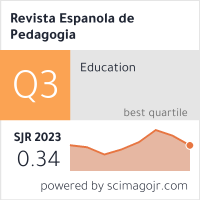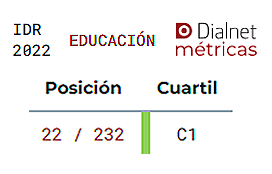Curren, R. (2022). Handbook of philosophy of education. (Ka Ya Lee and Eric Torres)
Resumen
The 2022 Routledge Handbook of philosophy of education (hereafter ‘the Handbook’), edited by Randall Curren, presents an impressive array of philosophical works on education, and represents the evolution of the field in the past few decades. The present review will provide an overview of 1) what the book accomplishes, and accordingly, what kind of audience would benefit from accessing the book; 2) what the Handbook does not cover (although such a gap may be more of a reflection of the state of philosophy of education as a field, not an indication of the coverage of the Handbook); and 3) a few divergent views among philosophers of education that future inquiries may address. ,
First, the Handbook offers insightful analysis on timely topics in education that will likely interest not only those deeply immersed in philosophy of education but also the general public and novices of the field. For instance, Danielle Allen and David Kidd’s chapter on civic education for the 21st century discusses how student identity, the development of an appreciable civic role, and educational practices consistent with what Mehta and Fine (2019) have called “Deeper Learning” should come together in service of civic education. The resulting framework could help guide decisions by school leaders and inform the contours of educational policy. Danielle Zwarthoed’s civic education in the age of mass global migration offers an insightful analysis of civic education in the context of mass migration. It provides a helpful reminder that not all children settle in the country of their origin. Anthony Simon Laden’s work on understanding claims of political indoctrination challenges the oft-dismissive tone of those unsympathetic to conservative worries about the liberalizing effects of higher education by taking seriously the disruptions to trust networks that college education can affect. Laden’s chapter, like many in the Handbook, sits in conversation with other pieces, such as Ben-Porath and Websters’ discussion of free-speech issues on college campuses and Johannes Drerup’s guidance on teaching controversial issues. These and other chap- ters each capture the contemporary anxiety over civic education under conditions of political polarization and address their motivating questions with insight, precision, and clarity. The result is a collection of work that is both broadly accessible and liable to generate refreshing new thoughts for scholars and practitioners alike. ,
JenniferMortonandChristopherMartin both address pressing ethical issues surrounding higher education, which has garnered increased public attention at least in the United States, Canada, and the United Kingdom partly due to the rising college tuitions and subsequent ethical and financial costs of obtaining undergraduate education. Finally, the Handbook also offers the perspectives of educational leaders and practitioners on frequently debated topics in education. Such examples include Yael Yuli Tamir’s accounts on the global and pernicious effects of the Program for International Student Assessment (PISA) test. ,
In addition to providing accessible and insightful coverage of issues with social significance, the Handbook provides several excellent summaries of the major branches of research in philosophy of education and other related fields such as sociology and history of education. Quentin Wheeler-Bell, for instance, explicates on the history of research in race and education and traces and critiques the different solutions offered to resolve the issue of racial domination in the education system. WinstonThompson also contributes a stand-out chapter that organizes overlapping ,
positions about whether and how to teach issues related to race, racism, and anti-racism into an array of possible normative positions, clarifying a discussion that often suffers from conflations or confusions of these distinct propositions. Gina Schouten similarly offers several competing accounts on the substantive meaning of the elusive concept “equal educational opportunity” proposed by herself and other prominent political philosophers in the past. Paul Watts and Kristján Kristjánsson excellently summarize the past and current research on character education, a topic that has a long and rich history in philosophy of education. ,
The majority of the chapters in the Handbook represents the fruits of the contemporary educational philosophers’ effort to push the boundaries of theorizing about education. If one wishes to delve deeper into a topic each chapter presents, we recommend exploring the works cited in the chapter of their interests. Furthermore, many of the chapters in the Handbook are a short summary of the philosophers’ book projects, which makes the Handbook a valuable accessway to deeper reading: the chapters by Martin, Morton, Lauren Bialystok, and Doris Santoro all correspond to their respective book publications (i.e., Martin, 2022; Morton, 2019; Bialystok & Andersen, 2022; Santoro, 2021). ,
Third, and perhaps most importantly, the Handbook represents methodologically and philosophically innovative works that should and would be further developed in the future. One such methodological evolution that the Handbook captures is the works that incorporate empirical evidence into normative theorizing. Meira Levinson’s chapter on educational justice, for example, articulates the need for philosophers to theorize from the ‘bottom-up’, starting with close attention to the experiences of educators in service of building a non-ideal theory of educational justice that reflects the realities and concerns of practicing educators. The shift to embed normative theorizing in empirical evidence is also present in Doris Santoro’s work on teacher burnout and Morton’s chapter, both of which notably feature qualitative research methods, specifically interviewing. ,
Other chapters take empirical data as their subject: Brighouse and Swift, for example, offer a framework for incorporating values and evidence into educational decision-making. Joyce and Cartwright, meanwhile, look specifically at the kind of evidence that ought to be considered appropriate for developing sound arguments in support of given policies, notably disputing both the sufficiency and necessity of Randomized Control Trials (RCTs) for many policy decisions. ,
In addition to capturing recent methodological shifts in philosophy of education, the Handbook also includes powerful and oft-underrepresented challenges to the long-held assumptions of the existing dominant voices. Nico Brando’s chapter on child labor, Zwarthoed’s explication on civic education in the age of mass migration, and Julian Culp’s work on global democratic educational justice all take into consideration the educational issues and perspectives unique to the developing, non-Western countries and meaningfully challenge the existing biases or assumptions held by philosophers of education based in the West. ,
Zwarthoed, for instance, introduces the idea of “sedentary bias”— the idea that students will became citizens in the countries of their birth — and compellingly argues that such bias renders the existing accounts of civic education somewhat obsolete: given that globalization and mass migration will likely accelerate, philosophical accounts of civic education ought not to take for granted that children become adults in their countries of origin and instead ought to adopt their thinking in light of the reality of mass migration. Similarly, Brando’s research on the ethical dilemmas surrounding child labor and educational access calls into question the Western philosophers’ implicit presumption that all children would be guaranteed compulsory formal education, thereby pushing the bounds of considerations that ought to be included when theorizing about educational justice. ,
The educational issues covered in the Handbook, however, are not exhaustive. None of the chapters, for instance, discusses early childhood education, which has been garnering increased attention among policymakers and scholars of educational studies. The paucity of works on adult education is also notable, with Martin’s chapter being the only exception. Importantly, nearly all chapters are about formal education and schooling, which creates a lacuna of inquiry on informal education. While a number of chapters — such as Bryan Warnick’s chapter on the role of discipline in the schools’ educational mission — treat the institution of schools as an object of scrutiny, most works situate their concerns squarely within schools without looking beyond their boundaries. Rather than implicating the coverage of the Handbook itself, these lacunae are probably best understood as gaps in concerted attention to these matters in the field of philosophy of education itself. Future philosophical inquiries regarding informal education and adult education would certainly enrich the existing landscape of philosophy of education. ,
Future research can also address the disagreements among contemporary philosophers of education that the Handbook makes apparent. One such potential divergence was the epistemic aim or goods of education. While epistemologist Catherine Elgin proposes autonomy as the epistemic goal of education and understanding as the epistemic good to impart to students through education, Ben Kotzee presents expertise as an important epistemic good to inculcate in students. Furthermore, Harvey Siegel, a well-known proponent of critical thinking, proposes the development of critical thinking as an educational ideal (e.g., Siegel, 1980). How are concepts such as understanding, expertise, and critical thinking related? What are their relationships to the epistemic goal(s) of education? More broadly, what is the difference between educational ideals, aims, and goods? The Handbook represents diverse and potentially conflicting views among epistemologists of education, which may yield fruitful direction for future research. ,
Another potential divergence that we observed concerns the aim of higher education, specifically whether upward mobility should be an ideal to embrace in higher education. As Curren notes in the introductory chapter, Morton calls for reevaluating upward mobility as an ideal of higher education. In comparison, Martin sees access to higher education as a matter of distributive justice and economic mobility as an ideal, along with the development of autonomy. Should upward mobility be an ideal for higher education? More generally, what should be the aim of higher education? Addressing these questions by putting these competing perspectives into conversation may advance the existing philosophical inquiries into the issues surrounding higher education. ,
Overall, the Handbook reflects out-standing progress in the contemporary philosophy of education in the past few decades. It provides rich, careful, and insightful reflections on education not only for informed readers but also for non-philosophical audiences. The topics covered in the Handbook are timely and critical, and the Handbook adequately reflects the recent methodological and content developments in the field. Most importantly, the Handbook itself is truly a celebration of the scholarly advances made in the ever-evolving field that is philosophy of education. It will undoubtedly prove a valuable resource for scholars, practitioners, and interested parties of all kinds. ,
Ka Ya Lee and Eric Torres ■ ,,
References ,
Bialystok, L., & Andersen, L. M. (2022). Touchy subject: The history and philosophy of sex education. University of Chicago Press. ,
Martin, C. (2022). The right to higher education:?A political theory. Oxford University Press. ,
Mehta, J., & Fine, S. (2019). In search of deeper learning. Harvard University Press. ,
Morton, J. (2019). Moving up without losing your way: The ethical costs of upward mobility. Princeton University Press. ,
Santoro, D. A. (2021). Demoralized: Why teachers leave the profession they love and how they can stay. Harvard Education Press. ,
Siegel, H. (1980). Critical thinking as an educational ideal. The Educational Forum, 45 (1), 7-23. Taylor & Francis Group. ,
Wolff, J. (2018). Method in philosophy and public policy: Applied philosophy versus engaged philosophy. In A. Poama (Eds.), The Routledge handbook of ethics and public policy (pp. 13-24). Taylor and Francis. https://doi.org/10.4324/9781315461731 ,,
Citación recomendada | Recommended citation
Lee, K. Y.,
&
Torres, E.
(2023)
.
Curren, R. (2022). Handbook of philosophy of education. (Ka Ya Lee and Eric Torres).
Revista Española de Pedagogía(1).
https://www.revistadepedagogia.org/rep/vol0/iss1/34
Licencia Creative Commons | Creative Commons License
Esta obra está bajo una licencia internacional Creative Commons Atribución-NoComercial 4.0.
This work is licensed under a Creative Commons Attribution-NonCommercial 4.0 International License









Commentarios | Comments
Curren, R. (2022).
Handbook of philosophy of education
Routledge. 464 pp.